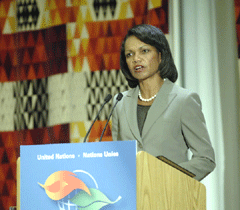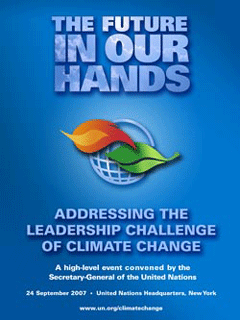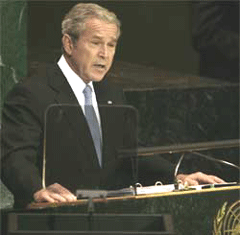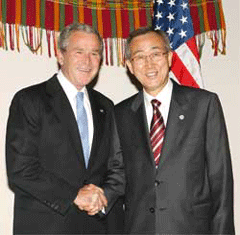Global Warming on the Global Stage
Air Date: Week of September 28, 2007

(Courtesy of United Nations)
From the UN to the White House, world leaders wrestled with the thorniest policy problems on climate change this past week. The message to America: the world is tired of waiting for the U.S. to act. Living on Earth's Jeff Young talks with host Bruce Gellerman.
Transcript
GELLERMAN: From the Jennifer and Ted Stanley studios in Somerville, Massachusetts—this is Living on Earth. I’m Bruce Gellerman, sitting in for Steve Curwood.
They called it ‘climate week.’ From the White House to the United Nations world leaders met and wrestled with the issue of global warming, asking ‘what’s the best way to curb greenhouse gas emissions?’ and ‘what will it take to get the world’s biggest emitters—China and the United States—to do more to avoid dangerous warming?’ President Bush and UN Secretary General Ban Ki-Moon hosted separate climate events just days apart with an eye toward the next major global conference on climate change in Bali in December. But while most of the world’s leaders agree that climate change is a serious problem, they’re still sharply divided on what to do about it.
Living on Earth’s Jeff Young followed the climate action in New York and Washington, which is where he is right now. Hi, Jeff.
YOUNG: Hi Bruce.
GELLERMAN: Busy week on the climate front but did they make any progress?
YOUNG: Well, the UN event drew more than 80 heads of state, which shows they take this seriously. The White House event, if nothing else, it got China and the U.S. talking. And there are hopes that they’ll keep talking and at the next talks maybe there will be a breakthrough and that would be in Bali.
GELLERMAN: That’s because countries’ commitments to cut CO2 under the Kyoto last only to what—2012, right? That doesn’t leave much time, Jeff.
YOUNG: That’s right, and don’t forget Kyoto also did not place limits on emissions from the bigger developing countries like India and China. And don’t forget the U.S. never ratified Kyoto. And add to that the growing scientific evidence of how rapidly the planet is warming. All of a sudden you see why Bali is so important. People feel they need to get the biggest countries on board and they need to do it fast.
GELLERMAN So, they’re still at a bit of a deadlock then, huh?
YOUNG: Pretty much, yeah.
GELLERMAN: But is the picture more complex than that? Did it seem to you that the warnings from the scientific community are getting through to the political leaders?

Poster at UN Climate Change Meeting (Photo: United Nations)
AHMED: I speak for Bangladesh and many others who are on the threshold of a climatic Armageddon. Climate change is fundamentally altering our lives. By some estimates, a one meter sea level rise will submerge one third of the total area of Bangladesh, thereby uprooting 25 to 30 million people. We cannot afford to remain idle until this misfortune actually unfolds. Waiting any longer will be at our own peril. I thank you, Mr. Chairman.
[APPLAUSE]
YOUNG: The arid parts of Africa, the small islands, all the less developed nations say they face the greatest threats from climate change and can least afford to deal with them. They want help to adapt to rising seas and drought and they demand that rich nations, especially the U.S., commit to further cuts in greenhouses gasses.
GELLERMAN: But Jeff, the United States opposes mandatory caps.
YOUNG: That’s right. So the U.S. Secretary of State Condoleeza Rice—when she spoke at the UN—emphasized the role of new energy technology.

Secretary of State Rice speaks at UN Climate Change Meeting (Photo: Michael Gross)
RICE: Ultimately, we must develop and bring to market new energy technologies that transcend the current system of fossil fuels, carbon emissions and economic activity. Put simply, the world needs a technological revolution.
YOUNG: Rice plays up the $18 billion the U.S. has spent on clean energy technology under the Bush administration, and she cautions that taking rash action to curb greenhouse gases carries the risk of holding back poor countries.
RICE: And especially for the millions of men, women and children in the developing world whose efforts to escape poverty require broad and sustained economic growth and the energy to fuel it.
YOUNG: So, while Rice said the U.S. is looking to expand its leadership here, it does not look like that means they’re willing to take on any sort of binding commitments.
GELLERMAN: And yet, it’s binding commitments that are exactly what most of the world and environmental groups are saying we need.
YOUNG: That’s right. So, when the President hosted his meeting on climate, environmental groups made sure they were heard loud and clear.
DEMONSTRATORS: No More Hot Air! Clean energy now! [CHANTING CONTINUES]
PASSACANTANDO: This meeting George Bush is holding on global warming is a fraud. It’s designed to prevent any action to stop global warming.
[CHANTING FADES UNDER]
GELLERMAN: So, Jeff, where are we right now?

President Bush addresses U.N. General Assembly
(Photo: US Department of State)
INSLEE: That is one of the vilest canards there is when talking about global warming. Tell the secretary to go to Bangladesh and talk to the millions of people whose land will be underwater. Tell her to go to the Sudan where we have huge conflict in part because we have increased desertification. The no-action option is economic disaster for the developing nations. Maybe we’ll be able to rebuild the shoreline of Manhattan but developing nations are not going to rebuild the shore of Bangladesh.
GELLERMAN: The vilest of canards. Boy….What was the reaction from the other countries that took part in the meeting, Jeff?

President Bush and UN Secretary-General Ban Ki-moon
(Photo: US Department of State)
YOUNG: Well, European leaders had some applause for the president’s effort to reach out here. But they remain very skeptical about the administration’s voluntary approach to reducing emissions. The Danish Environment Minister Connie Hedegaard argues that it’s not enough to just do the research and development. If you want clean energy, she says, you have to create a market for it. And she says the way to do that is a mandate that will put a price on those carbon emissions.
HEDEGAARD: You cannot just have voluntary goals, you have to have targets. Because we are getting a bit impatient, not on our own behalf but on behalf of the planet because things have to move with a greater speed—that is what science tells us.
YOUNG: I found the politics at work here interesting. The Europeans were clearly trying every angle to press their point. They didn’t just go to the president’s event; they also made very public visits to Congress, where, of course, Democratic leaders are pushing for mandatory caps on carbon emissions. And some of the European officials I spoke with say that gives them leverage when they go to talk with the White House about climate. And also, Bruce, I also got a sense that a lot of the global community is already looking past the Bush administration. They’re hoping they’ll have better luck on this issue with the next person who occupies the White House after the elections.
GELLERMAN: But what about China? I mean, they’re growing like crazy and, depending on who’s counting emissions, China already has or soon is going to pass the United States as the biggest source of CO2. Did you learn anything about where the Chinese see themselves fitting into all this?
YOUNG: Well, of course China and the U.S. have been at a sort of stalemate on this. Neither wants to jeopardize their competitive advantage by, you know, limiting the energy they might consume, or raising the cost of manufacturing. So, it’s kind of like, I see two people standing at an open door and they’re each saying to the other, “oh no, after you.” And this has been going on for what-- ten years?
However, Chinese officials I heard this week say they know that climate change is a serious threat and they insist they are doing things about it—it’s just in their own way. Xie Zhenhua is China’s vice chair for national development. I heard him at an event where he talked about reforestation and energy efficiency, and even family planning as a way to cut CO2.
[XIE SPEAKING MANDARIN]
VOICEOVER: We have avoided the birth of more than 300 million people, which is equivalent to the avoidance of CO2 emissions by 1.3 billion tons. We are trying our best efforts to integrate policy on climate change.
YOUNG: So I heard the Chinese saying they’re willing to do more, but their bottom line does not appear to have moved. And that bottom line is the U.S. and the other developed nations created most of this problem, therefore they’re the ones that need to take most of the action.
GELLERMAN: So, the ball is still firmly in the United States’ court.
YOUNG All eyes are still on the U.S. It’s clear that without leadership from the world’s richest country, the world’s biggest historic greenhouse gas polluter, there’s little chance of bringing the other major polluters on board.
GELLERMAN: Well, thank you very much, Jeff.
YOUNG: You’re welcome.
GELLERMAN: Living on Earth’s Jeff Young reporting on climate week events in New York and Washington, D.C.
Links
UN High Level Event on Climate Change
White House Meeting of Major Economies on Climate Change
Hear more of what environmental groups around the world think of the White House climate conference
Living on Earth wants to hear from you!
Living on Earth
62 Calef Highway, Suite 212
Lee, NH 03861
Telephone: 617-287-4121
E-mail: comments@loe.org
Newsletter [Click here]
Donate to Living on Earth!
Living on Earth is an independent media program and relies entirely on contributions from listeners and institutions supporting public service. Please donate now to preserve an independent environmental voice.
NewsletterLiving on Earth offers a weekly delivery of the show's rundown to your mailbox. Sign up for our newsletter today!
 Sailors For The Sea: Be the change you want to sea.
Sailors For The Sea: Be the change you want to sea.
 The Grantham Foundation for the Protection of the Environment: Committed to protecting and improving the health of the global environment.
The Grantham Foundation for the Protection of the Environment: Committed to protecting and improving the health of the global environment.
 Contribute to Living on Earth and receive, as our gift to you, an archival print of one of Mark Seth Lender's extraordinary wildlife photographs. Follow the link to see Mark's current collection of photographs.
Contribute to Living on Earth and receive, as our gift to you, an archival print of one of Mark Seth Lender's extraordinary wildlife photographs. Follow the link to see Mark's current collection of photographs.
 Buy a signed copy of Mark Seth Lender's book Smeagull the Seagull & support Living on Earth
Buy a signed copy of Mark Seth Lender's book Smeagull the Seagull & support Living on Earth

